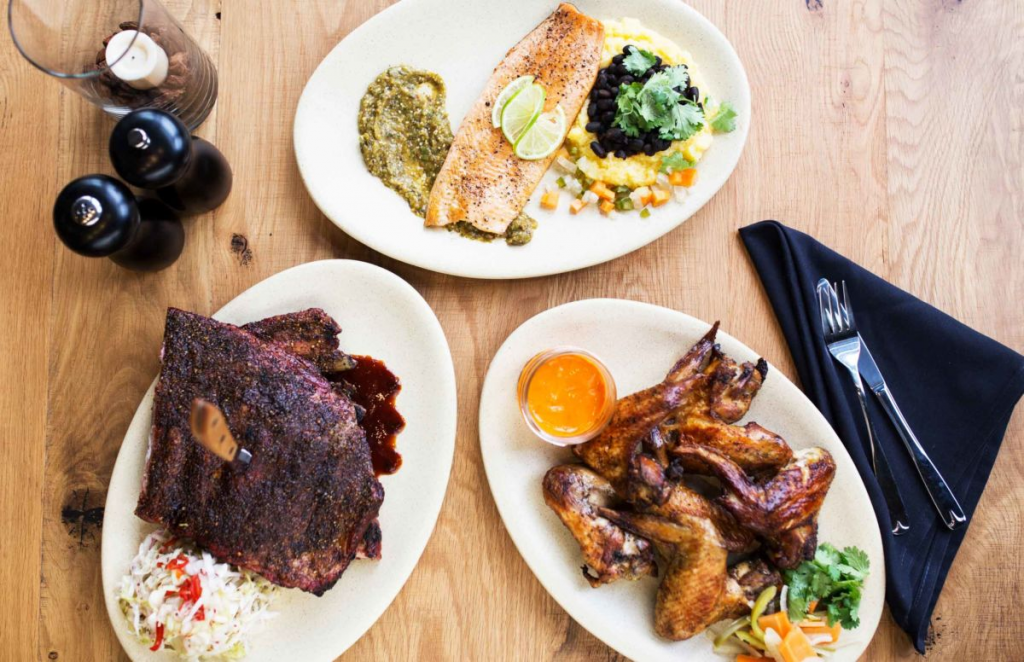Originally published in the December 2016 issue of (614) Magazine

First, forget everything you know about barbecue.
It’s not because you’re wrong — it’s because barbecue is more than you probably think. It’s not just having the talent and patience to let food cook low and slow. It’s about assembling the right ingredients and giving them just enough time to create something that defies expectations.
That’s exactly what you’ll find at Rooks Tavern, a dining destination with the neighborhood feel necessary to stand out, after years of mindful and meticulous preparation and planning.
“Originally, it was just going to be a typical Texas barbecue joint. We’d open at eleven, and close when we were out of meat,” explained owner John Havens, half of the creative duo behind Rooks Tavern. “That’s such a part of Texas culture, but it’s not like that in Columbus.”
“The original menu design was developed over two years through a combination of investigation and experimentation,” noted owner Aaron Mercier, the other half of Rooks Tavern. “We’re respectful of the ingredients, and the culinary traditions we’re applying. But we’re also doing something unexpected.”
“Barbecue can be so much more than ribs, pulled pork, and brisket — all of ours are excellent by the way,” Havens quipped. “But, every culture in the world has a barbecue tradition.”
The two met in high school, and despite a few moves along the way, both settled back in Columbus. Havens’ formal background in portfolio management, and Mercier’s in medieval literature, aren’t the common curriculum vitae for two guys elbowing their way into the restaurant racket. But their authentic Texas roots and keen kitchen chops are actually enhanced by the sense of trends and love of language that set Rooks Tavern and its evolving menu apart.
“One of our best-selling dishes is our beets. We take beets and par-cook them, then throw them in the coals of the fire,” Havens confessed. “After a while we pull them, peel them, and serve them over sheared chevre and a beet green puree — then we take some of those ashes that we keep and mix it with the salt. It’s one of the best things on the menu, and it’s totally vegetarian.”
“I tried it once and it was a smash hit,” Mercier noted. “It’s a process of research, citation and adaptation.” (It turns out that Copenhagen beet barbecue was actually inspired by a Danish dish Mercier found and refined into something entirely original.)
You’ll find more than a few surprises on the menu, as well as daily and seasonal specials — pulled pecan-smoked ruby trout, low country succotash, and a Western-inspired French stew they describe as a “Cowboy Cassoulet”. Weekends get weird with smoky banana-pecan French toast with Mexican chocolate, rib-meat poutine with mole gravy, and the “Austin Hangover” featuring up to a full pound of pulled pork or brisket, slow-cooked for 18-hours in one of Rooks’ two custom smokers — affectionately named “Pancho” and “Lefty”.
Rooks Tavern chooses local ingredients whenever available and appropriate for the menu, with more than a dozen farmers, bakers, and makers stocking their kitchen.
“Barbecue gets maligned as simple comfort food and very rarely gets elevated to fine cuisine, which it absolutely should be. It takes so much more work and knowledge and art,” Havens said. “We have no gas firing our smokers or our grill. It’s all based on how long can you hold your hand over it and how hot is it. So our cooks are constantly adapting. There are so many more variables.”
Another challenge in opening any restaurant is breaking through with customers, critics, and fellow culinary professionals in a city that takes its restaurant scene very seriously.
“I learned a lot about how to open restaurants the right way — and the inevitable chaos even when you’re doing it the right way,” Mercier explained, whose tenure at The Guild House was a proving ground for the process of opening their own restaurant.
Beneath their beards and boyish charm, both hide the résumés of restaurateurs forged by fire. Instead of tutoring for extra cash while finishing his dissertation, Mercier was working at Austin’s famous Blue Ox. Havens was trudging through stock trades by day, but also seasoning his partner with pictures of food trucks by email, hoping to find the right nudge.
“We were unusually prepared for a couple of amateurs,” Mercier chided. “We were ready to be unready.”
Eventually, the idea settled in during a summer stint with family and friends in the Adirondacks. Sitting out on the dock after supper, taking in the still of the lake and a generous share of bourbon, the two decided the time to fail was while they were still young enough to recover. After a couple more years of slow, steady heat, Rooks Tavern was finally ready to serve.
“Restaurateurs want other restaurateurs to succeed. It’s incredibly supportive here,” Mercier revealed. “Young chefs in particular want to raise the bar in this city, responding to national trends but applying Midwest values to them, to make them accessible.”
When best friends go into business, it can easily become a recipe for disaster. But these two wiseacres seem to have it down. Even the most incidental interaction reveals Havens is the affable Ben Affleck matched by Mercier as the more ruminating Matt Damon. Yet both are free from the ego that easily comes from early success.
When pushed for the biggest disagreement they’ve had in opening the restaurant —who won, and who was right — the answer was unequivocal.
“The menu…” Mercier replied without hesitation, about two seconds before Havens cut him off with a swift, “I won.”
Who was right is still disputed. Mercier contends the language in the original menu was too heavy-handed. Havens concedes it could use some tinkering.
Much like their barbecue, the truth is probably in the middle — never overcooked, nor underdone — but always adapting and improving. ▩